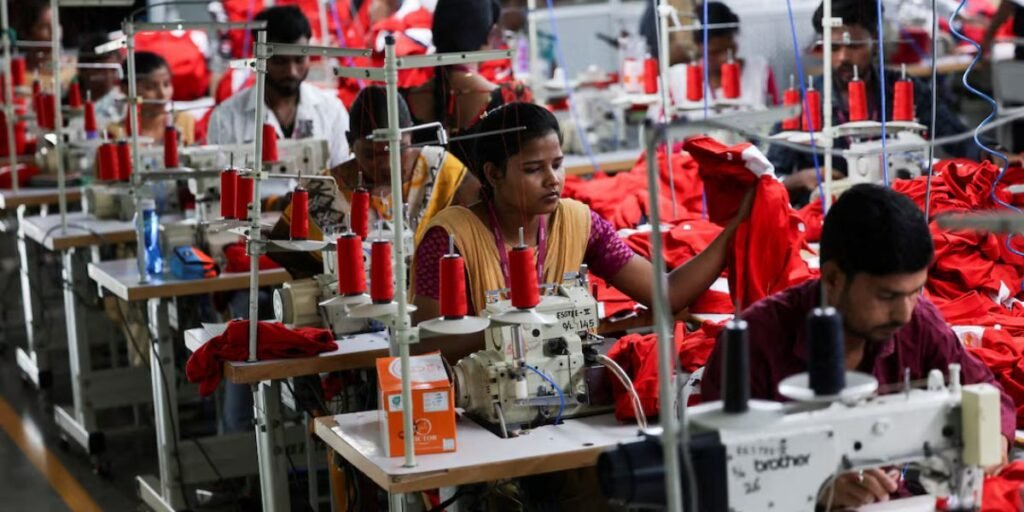Webdesk: India’s garment industry is suddenly in deep trouble, with panic spreading across major production hubs after US President Donald Trump slapped steep new tariffs on Indian apparel exports, as per a Reuters report.
Factories that were once optimistic are now rushing to respond as orders from American buyers are either being put on hold or cancelled altogether.
Pearl Global, one of India’s top exporters that supplies well-known US brands like Gap and Kohl’s, has already been hit hard.
The company is now receiving late-night calls from anxious clients demanding one of two things: either share the impact of the tariff or move production out of India.
Its managing director, Pallab Banerjee, said customers have been very clear. “All the customers are already calling me. They want us to… shift from India to the other countries,” he said.
To avoid losing clients, Pearl Global has offered to move production to its overseas units in Bangladesh, Vietnam, Indonesia and Guatemala.
These countries currently face lower tariffs than India, making them more attractive to US buyers.
The situation changed rapidly this week when the US government imposed a 25 per cent tariff on Indian garments, with another 25 per cent set to take effect on August 28.
The full 50 per cent rate comes as a penalty linked to India’s purchases of Russian oil.
These duties are much higher than the 20 per cent faced by Bangladesh and Vietnam, and even above the 30 per cent on Chinese garments. Exporters now fear losing business to these competitors.
Only a few months ago, exporters in India’s southern city of Tiruppur, known as the knitwear capital of the country, were feeling hopeful.
They believed the political crisis in Bangladesh and the shift away from China gave India a unique chance to boost its share in the 16 billion dollar US apparel market. But that optimism has quickly disappeared.
Naveen Micheal John from Cotton Blossom India, a major firm in Tiruppur, said buyers have started telling suppliers to pause shipments.
“An importer, which had placed orders for underwear, has come back saying that if you haven’t purchased yarns… keep it on hold for now,” he told Reuters. Other factories are trying to ship as much as possible before the second round of tariffs begins.
Some garments exported from Tiruppur cost US clients just 1 dollar. A men’s or women’s T-shirt is often priced between 3.5 and 5 dollars.
A 50 per cent tariff could make them far too expensive, said N Thirukkumaran, general secretary of the Tiruppur Exporters Association.
The timing is especially bad for the Modi government, which has been promoting its “Make in India” initiative to encourage domestic manufacturing. If more exporters shift production abroad, this policy could suffer a major setback.
Firms without global manufacturing options are at particular risk. While Pearl Global can rely on its factories in other countries, many exporters rely only on their Indian units.
That includes companies like RichaCo Exports, which shipped 111 million dollars’ worth of garments to the US this year.
Nearly 95 per cent of its Indian revenue comes from American buyers.
“We’re exploring setting up a manufacturing base in Kathmandu,” said general manager Dinesh Raheja. “The industry is in the doldrums.”
Raymond, another top Indian clothing company, said it was looking to expand production at its factory in Ethiopia, where tariffs are much lower at just 10 per cent.
Finance chief Amit Agarwal said new production lines could be added within three months to meet demand from US clients.
The pressure is spreading to other industries, too. Titan, India’s largest jeweller and watchmaker, said it is looking at moving part of its manufacturing to the Middle East to maintain access to the US market without heavy tariffs.
New Delhi has called the new duties “extremely unfortunate”, but exporters say the damage has already begun.
The once-promising window to capture more of the US apparel market is closing fast. Without fast action, more Indian businesses may be forced to look beyond their own borders just to survive.
Read more: India’s missile ambitions raises alarm in South Asia





